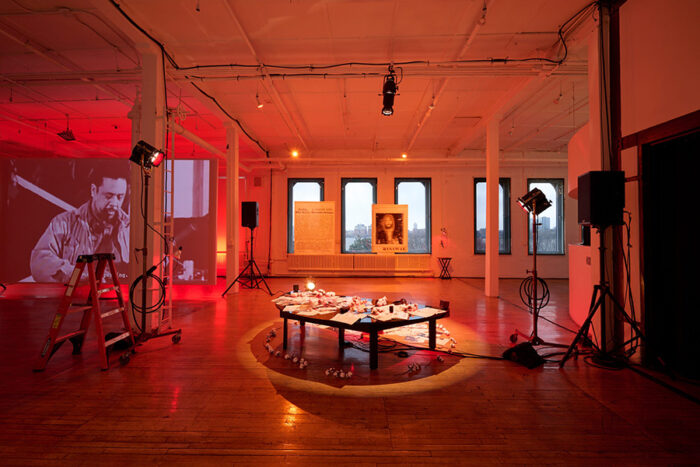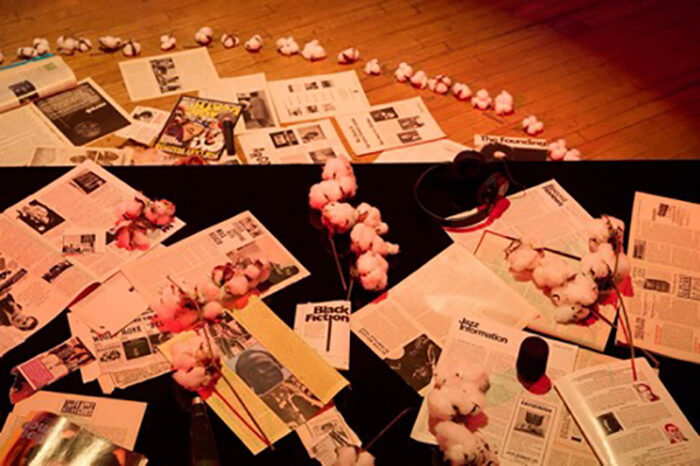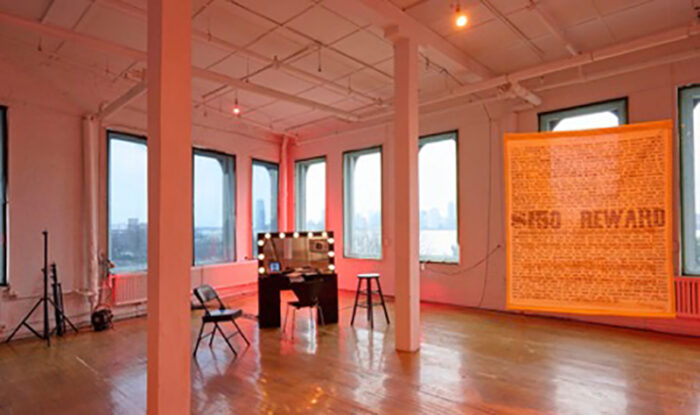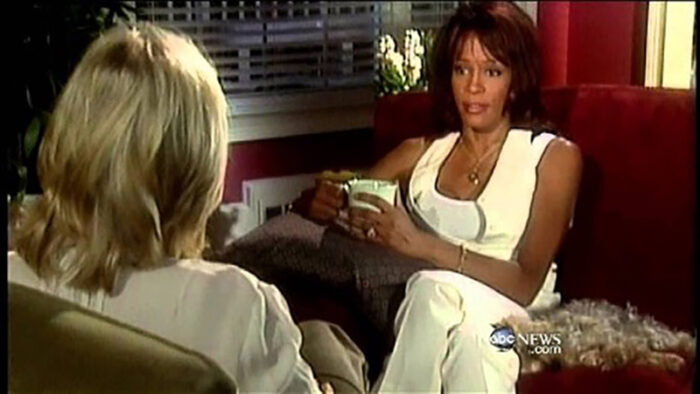
“As the curtain rises, revealing a glimpse behind the screen, The Kitchen at Westbeth Bank Street Loft is transformed, and we are transported into a world of meticulous intention and history. The set, hidden from view until now, emerges like a well-guarded secret finally unveiled. This show lays the foundation for what unfolds after the final curtain call, as the lights dim and credits roll, revealing what happens after and beyond. This is ‘BLACK BACKSTAGE,’ the first solo exhibition of writer, dancer, experimental filmmaker, and archivist Harmony Holiday.
In the liner notes, Harmony Holiday states: ‘Life on stage often enables dysfunction or mandates it; it’s very strenuous to be a spectacle and an illusion, to fulfill and disappoint the fantasies of passive but entitled audiences who want dinner and a show, on time, rehearsed, identical to how they conceive it, and see any fluctuations in performance as betrayals or derailments.’ The illusory stage has been set in Harmony Holiday’s ‘BLACK BACKSTAGE,’ where history, performance, and the brilliance of black artistry take center stage.

In the center of the space, a Le Corbusier-style white leather sofa faces a projection of Harmony Holiday’s short film ‘Abide With Me, 2024,’ which explores the life of American pianist and composer Thelonious Monk. Narrated by Fred Moten, poet, and theorist, the film features images of black icons such as Nina Simone, Tina Turner, and John Coltrane. Almost instinctively, I was drawn to Fred Moten’s benevolent voice. Deep and resonant, there was a crispness to his voice that silenced any sound around me. It felt familiar, like that wise uncle who had seen some things. I thought, if I ever got someone to narrate as Jesus, it would have to be him. Throughout the show, his voice guided, but Harmony’s words stayed with me. Holiday is akin to a skilled producer meticulously shaping an environment where sight and sound deceive, creating an immersive experience beyond expectation. Its expansive ambiance invites playful exploration, reminiscent of the late producer J Dilla. Like Dilla, she remixes and samples the past, present, and the poetics of language to create this liminal space.

There was always something, a word, a saying, something I remembered that altered what I was experiencing. Harmony’s ability to expand language and history is vividly portrayed in ‘Industry Plant, 2024.’ Within its confines, a truncated half-circle stage shares space with archival issues of Downbeat, an American music magazine renowned for its coverage of jazz, blues, and beyond. Amidst the cotton stems and a solitary microphone, a torn piece of paper bears the words ‘Black Fiction,’ a detail that lingered with me long after leaving.

Throughout the exhibition, the boundary between reality and artifice blurred, leaving me oscillating between certainty and doubt. ‘Industry Plant’ emerges as a repository, preserving fragments akin to those of an unwritten epic novel. There are many offerings throughout the exhibition that invite you to engage with their content.
To the left of the movie sits ‘Life of the Party, 2024.’ A glossy black vanity with a small picture of D’Angelo and Grace Jones on the mirror, with a binder of papers titled ‘setlist,’ a hot comb, and an old portable TV monitor. I took a seat at the vanity; like a magnet, my eyes were transfixed on the gold hot comb. I had memories of my mom and her hot comb. Like a family heirloom, she kept hers for decades, no longer gold but blackened from years of use. If I go back to Memphis, I can be sure that hot comb is still there. I sat at the vanity and looked at my reflection in the mirror, considering the many ways I was tethered to my own performance, or ideas of what I thought it should be.


As I reflected on the black glossy vanity as a tool for black performance, I couldn’t help but think about other black performers with contentious personas in the media who have always been a part of my life, whom I idolized, and who helped shape my connection to blackness. Whitney Houston was someone I always looked up to. Even though she lives in gifs and memes on my phone, she had a complicated identity in the media. Reflecting on the black vanity in ‘Life of the Party,’ 2024, I thought about the images of the late Whitney Houston’s drug-filled bathroom vanity taken in her Atlanta home, which were published by The National ENQUIRER in April 2006. Kanye West later spent $85,000 on the photo for Pusha T’s album ‘Daytona.’ Black backstage provided moments like this where I had to grapple with the artifice of celebrity and black performance, and what things I knew and thought I knew.
In Whitney Houston’s 2002 interview with Diane Sawyer, where she infamously said ‘Crack is Wack,’ concluding the interview, she also stated, ‘I am not self-destructive. I’m not a person who wants to die. I’m a person who has life, who wants to live.’ This quote encapsulates some of the sentiments I could not articulate, capturing the complex beauty of what Harmony Holiday bestowed upon us in ‘BLACK BACKSTAGE.’

‘BLACK BACKSTAGE’ is a captivating reflection of black performers, embodying a rich tapestry of messiness, ambiguity, and boundless potential. It serves as a tether to familiar narratives, intertwining the known and the unknown within the porous realm of blackness. Through the voices of iconic figures who have shaped black expression across music and oral traditions, the stage is set for a fresh exploration of black performance. Harmony Holiday skillfully navigates the complexities of identity, history, and artistry, inviting audiences to delve into the profound depths of black poetics and the ambiguities of its reception in a wider society. Within this exploration lies an invitation to confront both the illusions and realities of the stage, whether literal or metaphorical.”
